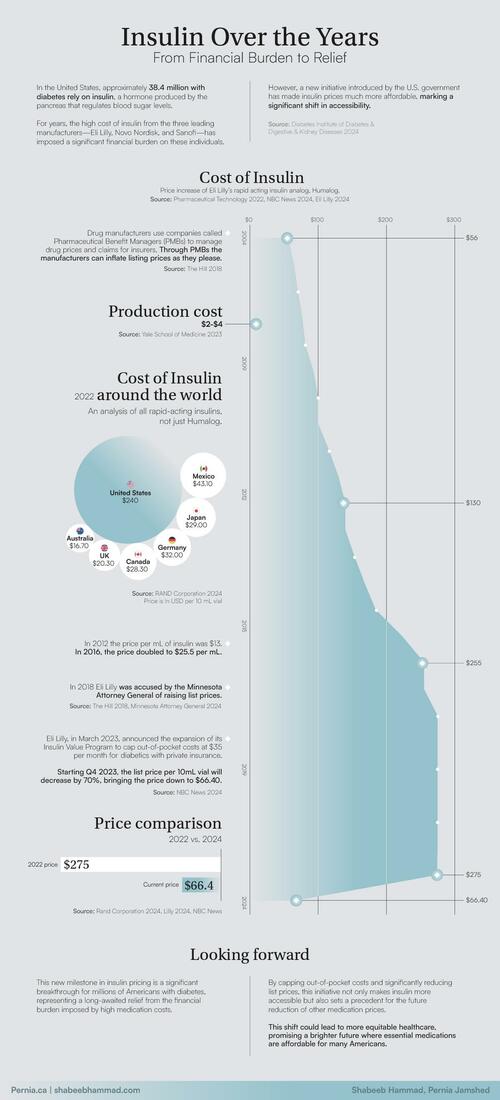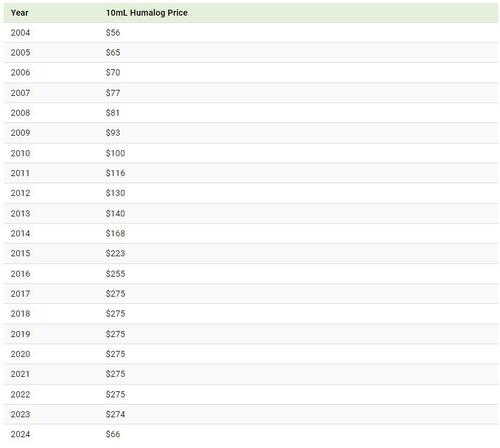
Over the past few decades, the cost of insulin in the United States skyrocketed, affecting millions of people with diabetes relying on it every day.
Insulin is produced by three major manufacturers in the U.S.—Eli Lilly, Novo Nordisk, and Sanofi.
This infographic by Visual Capitalist's Pernia Jamshed and Shabeeb Hammad focuses on the drastic price rise of Eli Lilly’s rapid-acting insulin, Humalog, using data sourced from Pharmaceutical Technology, NBC News, and Eli Lilly.
Cost of Insulin from 2004 to 2024
Humalog is one of the most well-known insulin brands globally. It is a fast-acting insulin that controls blood sugar levels in people with type 1 and type 2 diabetes.
In 1996, when it was first introduced, a 10 mL vial of Humalog cost $21.23. A decade later, this price shot up by over 200% to $70 USD.
Over the 10 years from 2006 to 2016, the cost of insulin in the U.S. climbed to $255 for 10 mL Humalog, a 264% increase. By 2017 it reached $275 before increasing public scrutiny and legislation to cap prices in certain states stopped the climb.
The cost to produce insulin, meanwhile, remained relatively constant. In 2023, an associate professor of medicine at Yale said that production costs of 10 mL Humalog were estimated to be between $2‒4.
So what drove the cost of insulin? The complex answer involved pharmacy benefit managers (PBMs), third-party organizations who negotiate drug prices on behalf of insurance companies, employers, and government programs. They negotiate discounts and rebates with the drug manufacturers (paying a reduced price), but in most cases the patients are charged the list price.
This enticement of rebates, and a lack of competition, caused prices to climb unchecked. Whether the extra cost paid by patients went to PBMs, insurance companies, or drug manufacturers depended on the specific drug system and contract, part of the call for greater transparency in the market.
Did Insulin Prices Come Down?
In March 2023, Eli Lilly announced that it would reduce prices of insulin by 70% towards the end of 2023.
This brought the price of 10 mL of Humalog to $66.40. In addition, it also announced that it planned to cap out-of-pocket costs for patients at $35 per month, irrespective of the cost of vials.
But the exact implementation of the measure, and whether costs will rise in other places, has been unclear for patients.
Over the past few decades, the cost of insulin in the United States skyrocketed, affecting millions of people with diabetes relying on it every day.
Insulin is produced by three major manufacturers in the U.S.—Eli Lilly, Novo Nordisk, and Sanofi.
This infographic by Visual Capitalist’s Pernia Jamshed and Shabeeb Hammad focuses on the drastic price rise of Eli Lilly’s rapid-acting insulin, Humalog, using data sourced from Pharmaceutical Technology, NBC News, and Eli Lilly.
Cost of Insulin from 2004 to 2024
Humalog is one of the most well-known insulin brands globally. It is a fast-acting insulin that controls blood sugar levels in people with type 1 and type 2 diabetes.
In 1996, when it was first introduced, a 10 mL vial of Humalog cost $21.23. A decade later, this price shot up by over 200% to $70 USD.
Over the 10 years from 2006 to 2016, the cost of insulin in the U.S. climbed to $255 for 10 mL Humalog, a 264% increase. By 2017 it reached $275 before increasing public scrutiny and legislation to cap prices in certain states stopped the climb.
The cost to produce insulin, meanwhile, remained relatively constant. In 2023, an associate professor of medicine at Yale said that production costs of 10 mL Humalog were estimated to be between $2‒4.
So what drove the cost of insulin? The complex answer involved pharmacy benefit managers (PBMs), third-party organizations who negotiate drug prices on behalf of insurance companies, employers, and government programs. They negotiate discounts and rebates with the drug manufacturers (paying a reduced price), but in most cases the patients are charged the list price.
This enticement of rebates, and a lack of competition, caused prices to climb unchecked. Whether the extra cost paid by patients went to PBMs, insurance companies, or drug manufacturers depended on the specific drug system and contract, part of the call for greater transparency in the market.
Did Insulin Prices Come Down?
In March 2023, Eli Lilly announced that it would reduce prices of insulin by 70% towards the end of 2023.
This brought the price of 10 mL of Humalog to $66.40. In addition, it also announced that it planned to cap out-of-pocket costs for patients at $35 per month, irrespective of the cost of vials.
But the exact implementation of the measure, and whether costs will rise in other places, has been unclear for patients.
Loading…






